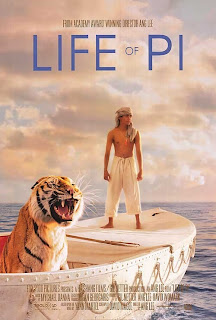** Spoiler Alert: This review contains specific references to the material in the film. If you do not want the plot spoiled, don't read on! **
I was prepared to dislike this film as heartily as I disliked the book, and as I imagine every experienced writer might dislike it for the same reasons. (I will explain.) It's part of the reason I hadn't rented it or seen it in theaters. Last night, I decided to give it a chance. I still dislike the same elements of the film that I disliked in the book, which must be some sort of compliment to how faithfully they followed the story.
The book is wonderful, and lyrical, and vivid, up to a point. I can buy nearly everything that happens, because it's presented realistically. Some of the best stories are made up of ordinary people thrust into extraordinary circumstances, and Pi is certainly that. First, it is a story of soul searching, with Pi seeking answers to his life in three different religious faiths. The story even opens with a claim that it can make you believe in God. All right, then, I thought, it's going to be a story of finding one's faith.
Then we have the shipwreck that strands Pi in a lifeboat with a variety of zoo animals, and it's a case of "Who's going to eat whom first?" He learns how to coexist with the tiger while stranded in this lifeboat, even when it's a tenuous sort of coexistence. There's the danger of the hungry tiger, seas teeming with sharks, and storms that threaten to capsize the craft. All the while, they worry about starvation and dehydration. All right, I thought, it's going to be a story of survival that tests one's faith.
At some point during the months of aimless drifting, Pi imagines luminescent sea creatures (i.e. a neon whale that breaches the ocean surface beside the boat and nearly overturns it). I can even put this down to seasick hallucination, and I'm able to pass that off. BUT ...
Here is where the writer lost me. Near the end of their strength, Pi and Richard Parker (the tiger) reach a floating, carnivorous island that is somehow safe during daytime, and whose water turns acid at night, devouring anything not up in the trees. The island is also covered with (wait for it) hordes of meerkats. At this point, the story whirls off into unbelievability, and it loses all the magic that it had built up.
All right, I thought, this is just too much.
This is where the author, Yann Martel, made his fatal mistake. You can ask a reader or viewer to believe in a fantasy world, or you can ask them to believe in your reality. Really, you can ask them to believe anything, but you need to establish the rules. At the beginning. He does not do this. The story opens as a realistic retelling by an ostensibly now well-adjusted man of his experiences on this lifeboat. There is no precedent set for the possibility that all might not be as it seems with this man. The viewer is led through an extraordinary adventure of survival, and all the way through it, before finding that this wonderful story we have shared is all just a metaphor for the trauma that really occurred while Pi was stranded in this lifeboat. It didn't happen. I felt cheated. Betrayed as a viewer. All of it was just a lie, and there was no indication that it might be a lie before Martel sprang the ugly truth on us. Pi even asks the man interviewing him which of the stories he prefers. The interviewer responds that he prefers the story of the tiger. Pi knows he has just led this man through a fabrication, so he's at least aware that the ugly truth is in there somewhere ... yet he's still willing to lead someone along with the fabricated tale. He has learned nothing. He has found no God. He is still willing to lie.
Readers do not like being cheated. Viewers do not like being cheated. If you are going to surprise them with an alternative ending, you must establish precedent in the form of clues or rules in the beginning that will make that alternative ending make sense. (Perfect example: The Sixth Sense, with Bruce Willis. All of the clues to the surprise were there, sprinkled through the film. The rules were established, and there, even if you didn't recognize them for what they were. That movie made me scream, "WOW!" and watch it all over again as soon as it ended.)
In the end, I don't feel Pi learned anything valuable, and therefore, I as a viewer didn't take home anything valuable. The film is beautiful, but for those jarring notes, and I will probably never watch it again for those reasons. Points galore to Ang Lee for the gorgeous scenery, and the score is fabulous ... but the story is, forgive me for the hackneyed phrase, an epic fail.
SCORE: Three of five stars


No comments:
Post a Comment